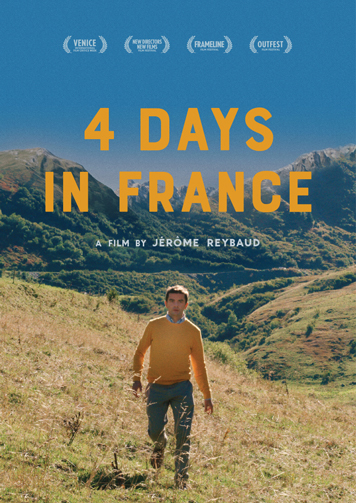| THE HIGH ROAD
an essay by melissa anderson “France is huge. Full of men, full of possibilities,” says Pierre (Pascal Cervo), the movie’s aimless motorist, to one of the temporary passengers in his white Alfa Romeo during his excursion through the country. Though Reybaud’s film, which unerringly bears out Pierre’s declarations, abounds with specifics—place names, distances—much about this protagonist remains a mystery, with biographical details parceled out intermittently. We learn that Pierre is thirty-six; has a position of some kind at the Sorbonne; and has completed a manuscript—one of the few possessions he takes on his solo road trip—with the unpromising title The Key Is on the Hook. In the film’s opening, predawn scene, he abandons his sleeping boyfriend, Paul (Arthur Igual), whose body, clad only in white briefs, Pierre scans with the flashlight of his iPhone. Why Pierre has decided to exit their haut-homo-bourgeois life in Paris is, again, never made exactly clear. That lack of backstory, though, isn’t evasive but liberating. 4 Days in France keeps viewers rooted in the present, each scene (and geographic destination) wholly unpredictable. On his odyssey south from the French capital, Pierre meets people, whether by happenstance or via app, of different genders and ages: for sex, for talk, for something else. The first of these encounters, with a woman named Diane Querqueville (Fabienne Babe)—her Seussian-sounding patronym also the name of a hamlet in Normandy—typifies the film’s tonic oddity. Stranded on the side of a sylvan road, her car kaput, Diane asks Pierre for a lift to Montgaris. A retirement-home chanteuse, Diane is one of several characters in Reybaud’s movie from a widely defined creative class; others include a Rimbaud scholar now running a tiny bookshop, a white-haired woman living in near isolation in the French Alps who’s an authority on Poussin. The singer’s chat with Pierre is, like all those that follow with other interlocutors, richly idiosyncratic: His explanation of what Grindr is (Diane is puzzled by the hookup app’s blllp notification sound) leads to a broader discussion about desire; their free-association game (which Diane suggests as an icebreaker) culminates with a Kylie Minogue lyric. After Pierre ferries Diane to her destination and continues his austral trek, we assume that we’ll never see her again. But Diane and many of the others with whom Pierre shares something—his car, a bed, sometimes no more than a glance—return to the film, fleetingly captured in moments of solitude. These mini-vignettes further evince the spellbinding qualities of 4 Days in France, a movie full of curiosity and temperate compassion for its cast of minor characters. We are left to imagine their lives: What, for example, could the saucer-eyed boy whom Pierre spots at a butcher shop be thinking about when we see him again, sitting in his darkened bedroom? With its occasional intergenerational man-on-man carnal pairings and provincial settings, 4 Days in France suggests an affinity with the films of Alain Guiraudie, especially his most recent, Staying Vertical, which features, as Reybaud’s movie does, an abundance of through-the-windshield shots. But Reybaud favors more voluble, learned characters; everyone in 4 Days in France would appear to be in expert in something, like the history-spouting leather-faced proprietor of an inn where Paul, now in pursuit of his lover, stays in the flyspeck town of Bruère-Allichamps. Likewise, anyone who watches 4 Days in France will invariably become, if far from a specialist, at least wiser about the country’s regions, its euphonious municipalities. As a bearish, epigrammatic tavern owner—with whom Pierre has an aborted assignation—homeschools his teenage godson on granular French geography, the viewers also benefit from the lesson. “Pathenay, Forges-les-Eaux, Écuisses, Issoire,” that dutiful pupil recites, each place name enunciated with incantatory power. Traversing long stretches of highway blight to wooded enclaves in the center of the nation to villages deep in the French Alps to towns overlooking the Mediterranean, Reybaud’s film similarly serves as a tonic lesson in physical particulars, each location populated with fascinating conversation partners. Constantly clutching his phone, Pierre never lives off the grid; no matter how remote his location, that Grindr ringtone never goes silent. Reybaud waggishly underscores the absurdity of algorithm-aided beeps and buzzes intruding on so much majestic scenery, but he has no interest in delivering an anti-tech polemic. Instead, 4 Days in France reminds us of the immense pleasures to be found in ignoring the commands of our devices, however indispensable they may be. -- Melissa Anderson is the film editor of 4Columns. Previously she was the senior film critic for the Village Voice, where a portion of this essay originally appeared. She is also a frequent contributor to Artforum and Bookforum. blog comments powered by Disqus |



